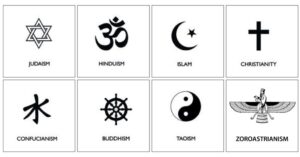
As people age gracefully into retirement, they often find themselves grappling with numerous anxieties and existential questions. A sense of void can emerge with the cessation of active professional life, triggering contemplations about the ultimate purpose of existence. Among the many profound questions that arise, one stands out prominently: Where do we go after this life?

People become philosophical in this age. This phase is marked by deep introspection. Aging people ponder age-old mysteries: What is the universe, and how did it originate? What is our relationship to it? Where did we come from? What happens after we die? What is the meaning of life?
Religion, Philosophy, and Science are three distinct domains that attempt to address the profound questions of human existence. Religion relies on belief and faith to provide answers about the afterlife, creation, and the purpose of existence, offering comfort and solace to many.
Conversely, philosophy guides individuals on how to live ethically and meaningfully, focusing on life’s practical and moral dimensions throughout life’s journey.
Science, however, delves into uncovering truths based on facts, evidence, and logic, exploring the universe through pioneering theories and discoveries. Brilliant minds like Albert Einstein and Stephen Hawking have just begun answering the age-old mysteries through their groundbreaking work on new dimensions of space and time.
Religions across the world provide answers to life’s profound questions. Christianity emphasizes eternal life and resurrection through salvation. Islam speaks of a paradise for the faithful, promising eternal reward. Hinduism and Buddhism highlight cycles of reincarnation and eventual liberation, known as moksha or nirvana. Judaism teaches about the World to Come (Olam Ha-Ba) and divine justice, while Zoroastrianism introduces the concept of the eternal battle between good and evil, with souls judged at the Chinvat Bridge.

Taoism, rooted in ancient Chinese traditions alongside Confucianism, emphasizes harmony with the Tao—the ultimate force governing the universe—and advocates spiritual immortality through alignment with nature and the cosmos. Similarly, indigenous and spiritual traditions across the globe echo these ideas, highlighting ancestral continuity, spiritual realms, and the soul’s ongoing journey. These beliefs provide hope and reassurance to those navigating the final stages of life.
Hence, religion and faith become anchors during this transformative stage for many aged people. They turn to their spiritual roots to find comfort, meaning, and answers to life’s big questions. Participating in rituals, prayers, or spiritual gatherings becomes a way to process fears and anxieties. Activities such as lighting candles in Buddhism, fasting in Islam, or meditating in Hinduism connect individuals to a higher power, fostering inner peace. Therefore, religion and faith act as a bridge between the known and the unknown, enabling individuals to face the inevitable with resilience and tranquility.
Whether through religion or philosophy, we often find ourselves surrendering to destiny, accepting life as it unfolds. However, some individuals defy this narrative, actively steering their lives even in old age. They remain engaged and vibrant, fully embracing this phase as long as their health supports them. This resilience often stems from careful preparation and thoughtful planning for their later years.
Stay tuned to know when and how to prepare for this phase of life in our next article …
References & Resources
Alorani, O. I., & Alradaydeh, M. T. (2017). The role of religion, spirituality, and/or belief in positive ageing for older adults. National Library of Medicine. Retrieved from https://pmc.ncbi.nlm.nih.gov/articles/PMC6319229/
Billy Graham Evangelistic Association. (n.d.). What do different religions believe about the afterlife? Retrieved from https://billygraham.org/answer/what-do-different-religions-believe-about-the-afterlife/
Bowker, J. (2003). World religions: The great faiths explored and explained. Dorling Kindersley Limited.
Chen, Y., & VanderWeele, T. J. (2023). How does religious belief affect the happiness of older adults? Religions, 14(2), 243. Retrieved from https://www.mdpi.com/2077-1444/14/2/243
End with Care. (n.d.). Death in different religions. Retrieved from https://www.endwithcare.org/blogs/FullPost.php?id=32
Koenig, H. G. (2018). Spirituality, religiosity, aging, and health in global perspective: A review. Journal of Religion and Health, 57(2), 44-63. Retrieved from https://pmc.ncbi.nlm.nih.gov/articles/PMC5758000/
Religion Media Centre. (n.d.). Death and funerals in world religions: Factsheet. Retrieved from https://religionmediacentre.org.uk/factsheets/death-funeral-rituals-in-world-religions/
Smith, H. (2009). The world’s religions: Our great wisdom traditions (50th Anniversary Edition). HarperOne.
Image credits: Adobe Shutterstock
Image source: Weeks, M. (2014). Philosophy in minutes: 200 key concepts explained in an instant. Quercus.




